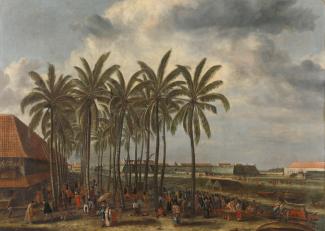While the Portuguese had the monopoly of transporting spices from the East Indies, Dutch merchants played an important role as middlemen in the further distribution of spices within 17th century Europe. In the early 1600s, strong incentives emerged for the Dutch to directly enter the spice trade. When Jan Huyghen van Linschoten – a Dutchman in the service of the Portuguese – published secret information about navigation to the Far East, Dutch traders commenced independent expeditions to Southeast Asia. The establishment of the Verenigde Oostindische Compagnie (VOC) or United East India Company – a coalition of existing merchant companies – required factorijen or trading posts to be created in Southeast Asia, with Batavia at its centre.
An ancient port
Batavia was situated on the north coast of Java, at the mouth of the Ciliwung River in the ancient port of Sunda Kelapa. Prince Jayawikarta, ruler of Jayakarta signed an agreement with Governor-General Jan Piertszoon Coen allowing the VOC to build warehouses on the east bank of the river, where it entered the harbour. The Sultan of Banten, along with the English, opposed the Dutch presence and separately besieged the settlement. A naval standoff resulted in Coen razing the Javanese settlement to the ground in 1619 and replacing it with the VOC’s Asian headquarters within a walled fortress - Kasteel Batavia.
Sultans of Java
The sultans of Java did not accept the presence of Europeans easily. The powerful Mataram kingdom that controlled Central and East Java and had interests in Banten in the west, strongly resisted the Dutch presence. In 1628 and again in 1629, Sultan Agung of Mataram launched attacks on Batavia which were repelled by the Dutch. Friction with Banten, also an English East India Company stronghold, continued throughout most of the 17th century. This ended in 1684 when the ruling sultan’s son Abdul Kahar allied with the Dutch to overthrow his father, Sultan Agung of Banten. The new Sultan gave the VOC monopoly rights over pepper in Banten and rival European factories in the city were closed. The Dutch were granted land to build another fortress, but the rival port sank into oblivion, giving primacy to the port of Batavia.
